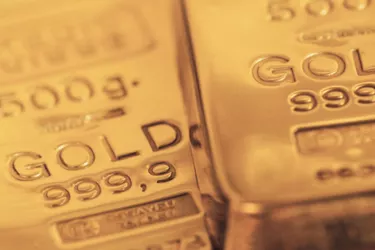
Gold bullion is a general term used to describe different types of gold that are made to be bought, invested in and sold. There's no specific type of bullion: Some manufacturers make coins while others make bars, and quality varies widely based on government laws and organization standards. In the gold market, bullion is typically useful as an investment tool. Like other assets, the value of gold moves up and down in the market, and a savvy investor can sell gold to make a profit, often selling to the dealer who supplied the gold in the first place.
Transaction Cost
Video of the Day
First the investor must calculate the transaction cost for the exchange. It's easy to sell gold back to the dealer that the investor bought it from, but there's a spread. The spread is the difference between the price the dealer charges for selling gold, and the price the dealer accepts for buying the gold. Buying prices are always less, since the dealer needs to make a profit, so investors who sell back their gold must do it at a discount. Spreads vary based on the type of bullion and the dealer.
Video of the Day
Rates
Transaction costs are usually expressed in the form of a percentage, the rate difference between the selling and buying price from the perspective of the dealer. Common bullion coins have a spread rate somewhere between 10 percent and 30 percent. Spreads rarely fall below 17 percent for most types of bullion and can rise as high as 200 percent for some types, which is how dealers can make a profit on gold while investors can struggle to sell their bullion for even a fraction of what it's worth.
Appreciation
Because investors can't immediately sell their bullion back to the dealer to make a profit, investing in gold becomes a waiting game. An investor buys gold from the dealer and sits on it, waiting for the market to improve to the point that the market value of the gold has offset the transaction cost and earned the investors a profit. The investor then sells the gold back at the right time to make the investment worthwhile.
Experience and Premiums
It may be tempting for investors to buy gold from one dealer and look for another dealer with better rates to sell it to. This isn't usually a good idea: Dealers tend to specialize in a certain type of bullion from specific countries and have the best idea of what it's worth, including premium prices. Another dealer may not know that gold market as well and may ask for an even lower price than the original dealer.